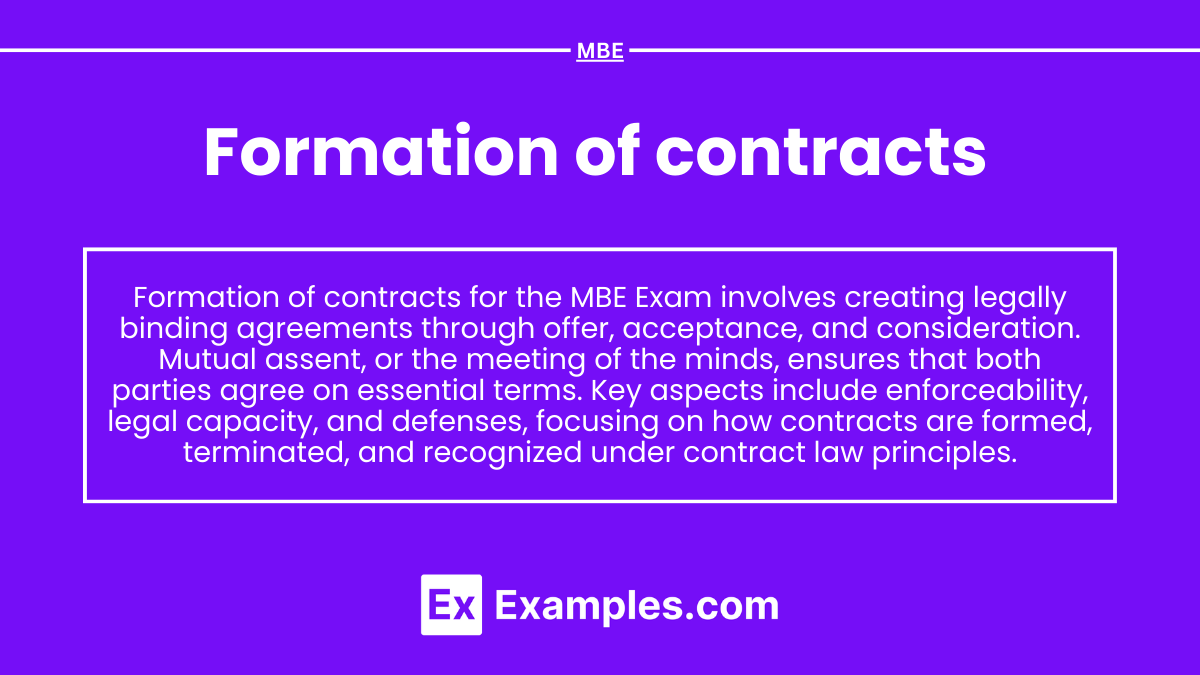Preparing for the MBE Exam requires a comprehensive understanding of the formation of contracts, a critical component of contract law. Mastery of offer, acceptance, consideration, and mutual assent is essential. This knowledge provides insights into legally binding agreements, defenses to contract formation, and enforceability, all crucial for achieving a high MBE score.
Learning Objective
In studying "Formation of Contracts" for the MBE Exam, you should gain a comprehensive understanding of the essential elements of contract creation, including offer, acceptance, consideration, and mutual assent. Analyze how these elements establish the enforceability of agreements and evaluate scenarios involving unilateral and bilateral contracts. Understand doctrines such as promissory estoppel, the Statute of Frauds, and the implications of capacity and legality. Additionally, explore how contract formation principles apply to real-world legal disputes and practice applying these rules and interpretations in MBE questions to strengthen your problem-solving skills and legal reasoning.
Essential Elements of Contract Formation
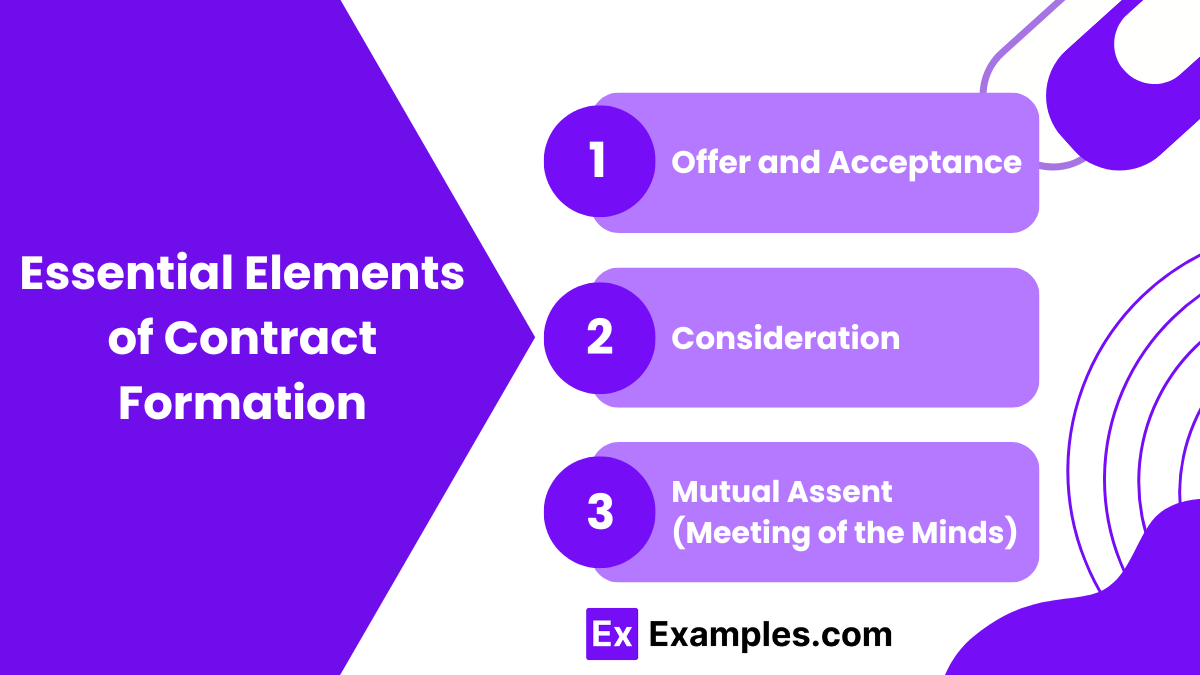
The essential elements of contract formation are critical to understanding when a legally binding agreement is created and enforceable. These elements ensure that a contract is valid and both parties are legally obligated to fulfill their promises. The essential elements include offer, acceptance, consideration, and mutual assent.
1. Offer and Acceptance
Offer
An offer is a clear proposal made by one party (the offeror) to another (the offeree) with the intention of creating a binding agreement upon acceptance. The offer must be communicated to the offeree and contain definite terms (e.g., subject matter, price, quantity). An offer can be terminated in several ways, including:
Revocation by the offeror before acceptance.
Rejection by the offeree, which can include a counteroffer that alters the terms of the original offer.
Lapse of time if the offer is not accepted within a specified or reasonable period.
Death or incapacity of either party.
Acceptance
Acceptance is the unqualified assent to the terms of the offer. It can be expressed (spoken or written) or implied through conduct. The acceptance must match the terms of the offer exactly, known as the mirror image rule, and must be communicated to the offeror. Special rules apply in cases of:
Unilateral contracts, where acceptance is by performance.
Bilateral contracts, where acceptance is a promise to perform.
Modes of Acceptance
The method of acceptance must follow the terms of the offer. If an offer specifies a means of acceptance, it must be followed. In cases where the offer does not specify, the offeree may accept using any reasonable method. Silence typically does not constitute acceptance unless there is a prior agreement that it does.
2. Consideration
Consideration is the value exchanged between the parties to a contract, making it enforceable. It can consist of a promise to do something or refrain from doing something (forbearance). For consideration to be valid:
There must be a bargained-for exchange between the parties.
The consideration must be of legal value, meaning it involves either a legal detriment to the promisee or a legal benefit to the promisor.
Adequacy of Consideration
Courts typically do not evaluate the adequacy of consideration, as long as it exists and is sufficient to support a contract. This means that even minimal consideration, if agreed upon, is typically sufficient.
Promises Enforceable without Consideration
Certain promises may be enforceable without consideration, including:
Promissory estoppel: When a promise, reasonably relied upon, causes detriment to the promisee.
Past consideration exceptions: In limited circumstances, promises made after a past act may be enforceable.
3. Mutual Assent (Meeting of the Minds)
For a contract to be valid, both parties must demonstrate a meeting of the minds, indicating mutual agreement on the terms of the contract. This is assessed using an objective standard, meaning the parties' actions and words are evaluated to determine intent, rather than their unexpressed thoughts. Essential factors include:
Intent to contract: Demonstrated through conduct, spoken words, or written terms.
Distinction from preliminary negotiations: Offers must be differentiated from mere invitations to negotiate, advertisements, or price quotes, which are generally not offers.
Mutual assent ensures that both parties have a shared understanding of their rights, obligations, and terms.
Contract Enforceability and Defenses
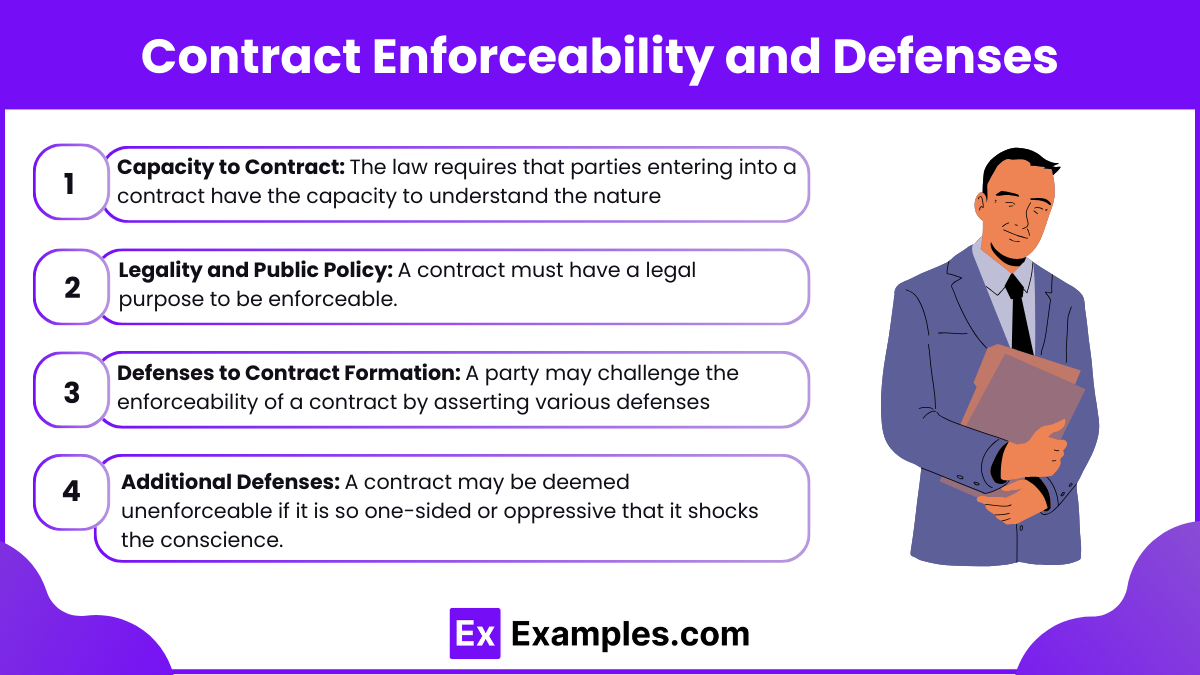
Understanding contract enforceability and defenses is critical for determining when a contract is legally binding and when it can be challenged or voided. A contract that meets all the elements of formation may still be unenforceable if certain defenses apply. This section covers the concepts of capacity to contract, legality and public policy, and the various defenses that may prevent enforcement.
Capacity to Contract
The law requires that parties entering into a contract have the capacity to understand the nature and consequences of their actions. If a party lacks capacity, the contract may be voidable at their option. Common areas where capacity issues arise include:Minors (those under 18 years old): Contracts with minors are generally voidable by the minor. However, contracts for necessities (e.g., food, shelter, medical services) may be enforceable to ensure fair compensation.
Mental Incapacity: A person lacking mental capacity due to a mental illness, defect, or temporary impairment (e.g., intoxication) may void a contract if they cannot understand its nature or consequences.
Intoxication: If a party was so intoxicated that they could not comprehend the contract, they may seek to void it, but this is generally difficult to prove.
A contract entered into by a party who lacks capacity can typically be ratified or affirmed once capacity is regained.
Legality and Public Policy
A contract must have a legal purpose to be enforceable. Contracts that involve illegal activities or violate public policy are generally void and unenforceable. Examples include:Illegal Contracts: Contracts involving criminal acts, such as drug trafficking or fraud, are void. This includes contracts that contravene statutory law or regulations.
Contracts against Public Policy: These are contracts deemed harmful to society or contrary to established societal norms. Examples include agreements that unreasonably restrain trade, contracts that waive liability for gross negligence, or contracts that interfere with family relations.
Courts may refuse to enforce a contract if it would result in unjust outcomes or violate fundamental public interests.
Defenses to Contract Formation
A party may challenge the enforceability of a contract by asserting various defenses, which, if proven, may render the contract void or voidable. These include:Fraud and MisrepresentationFraud: If one party intentionally makes a false statement to induce the other party to enter into the contract, the innocent party may void the contract. Fraud requires a knowing or reckless false statement of a material fact.
Misrepresentation: This involves an untrue assertion of fact, made either negligently or innocently, that induces the other party to enter into the contract. If it is material, the affected party may void the contract.
Duress and Undue Influence
Duress: A contract is voidable if one party is forced to enter it under the threat of harm, either physically or economically. The coercion must be sufficiently serious to overcome the party's free will.
Undue Influence: This occurs when one party exerts excessive pressure on another, exploiting a relationship of trust or dependence to gain unfair advantage. Examples include relationships between caregivers and elderly patients.
Mistake
Unilateral Mistake: When only one party is mistaken about a material fact in the contract, the mistaken party may void the contract under limited circumstances (e.g., if the non-mistaken party knew or should have known about the mistake).
Mutual Mistake: If both parties share a mistaken belief about a material fact that significantly affects the contract, the contract may be rescinded.
Additional Defenses
Unconscionability
A contract may be deemed unenforceable if it is so one-sided or oppressive that it shocks the conscience. This typically involves two elements:Procedural unconscionability: Unfairness in the process of contract formation, such as deceptive tactics or an imbalance in bargaining power.
Substantive unconscionability: Excessive or harsh terms within the contract.
Statute of Frauds
Certain contracts must be in writing to be enforceable under the Statute of Frauds. Examples include contracts for the sale of land, contracts that cannot be performed within one year, and contracts for the sale of goods over a certain value. If a contract falls within the Statute of Frauds but lacks a written agreement, it may be unenforceable unless an exception applies (e.g., partial performance, promissory estoppel).Illegality and Violation of Licensing Requirements
Contracts that involve illegal conduct or violate licensing laws may be unenforceable. However, not all violations of licensing requirements render a contract void; it depends on whether the purpose of the licensing law is to protect the public or raise revenue.
By understanding these aspects of enforceability and defenses, parties can better navigate contract law and protect their interests.
Promissory Estoppel and Reliance
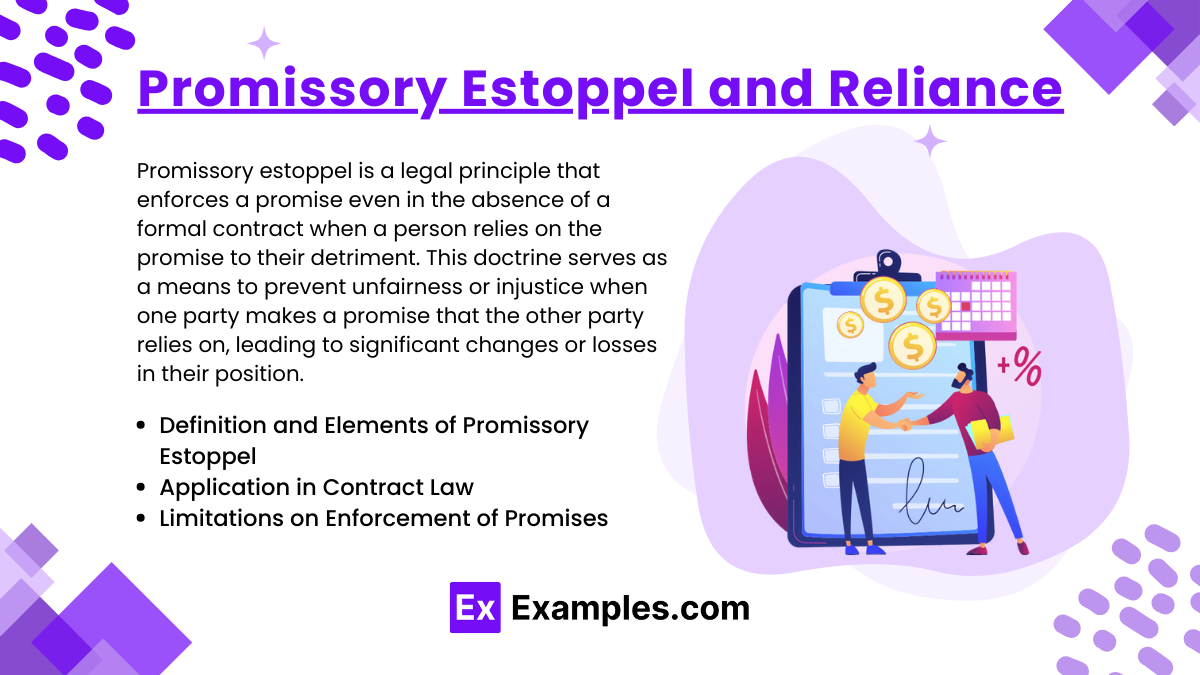
Promissory estoppel is a legal principle that enforces a promise even in the absence of a formal contract when a person relies on the promise to their detriment. This doctrine serves as a means to prevent unfairness or injustice when one party makes a promise that the other party relies on, leading to significant changes or losses in their position. The key elements and applications of promissory estoppel are discussed below.
Definition and Elements of Promissory Estoppel
Promissory estoppel arises when the following elements are present:Clear and Definite Promise: The promisor makes a clear and unambiguous promise to the promisee, which creates a reasonable expectation that the promise will be honored.
Reasonable and Detrimental Reliance by the Promisee: The promisee must reasonably rely on the promise in such a way that it causes them to take a specific action or refrain from taking an action. The reliance must be significant enough to lead to a detriment or loss.
Justice Requires Enforcement of the Promise: Courts enforce promissory estoppel to avoid injustice when the promisee would suffer substantial harm or unfairness if the promise were not upheld.
Application in Contract Law
Promissory estoppel is often used as an alternative to traditional consideration in contract law when a formal contract does not exist but a promise has been made and relied upon. It provides a means to hold a promisor accountable even if all the elements of contract formation are not present. For example:Employment Promises: If an employer makes a clear promise of job security and an employee relies on that promise to their detriment (e.g., relocating), promissory estoppel may be invoked if the employer revokes the promise.
Gift Promises: In some cases, a gift promise that would not typically be enforceable can be upheld if the promisee relies on it to their detriment.
Limitations on Enforcement of Promises
While promissory estoppel serves to protect promisees, its application has limits:The reliance must be reasonable and foreseeable; a promisee's reliance cannot be irrational or unforeseen by the promisor.
Courts typically award damages under promissory estoppel to compensate for the promisee's reliance interest rather than to enforce the actual promise. This means that the goal is to put the promisee in the position they would have been in if the reliance had not occurred, rather than to give the promisee the exact benefit of the promise itself.
By providing a mechanism to enforce promises in the absence of a formal contract, promissory estoppel upholds fairness and accountability, ensuring that a promisor does not unfairly benefit from a promise that led another party to change their position.
Statute of Frauds and Writing Requirements
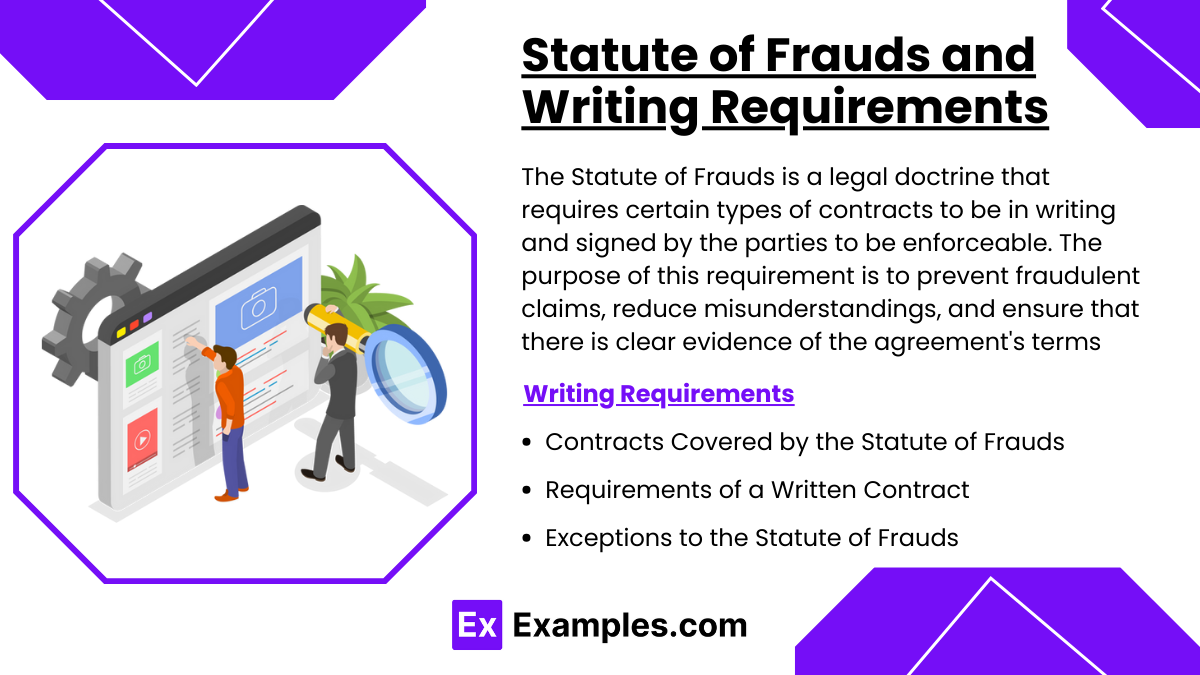
The Statute of Frauds is a legal doctrine that requires certain types of contracts to be in writing and signed by the parties to be enforceable. The purpose of this requirement is to prevent fraudulent claims, reduce misunderstandings, and ensure that there is clear evidence of the agreement's terms. If a contract falls within the Statute of Frauds but is not in writing, it may be deemed unenforceable unless an exception applies.
Contracts Covered by the Statute of Frauds
The Statute of Frauds typically requires the following types of contracts to be in writing:Contracts for the Sale of Land: This includes any agreements involving the transfer of ownership, leases, or interests in real estate.
Contracts that Cannot Be Performed Within One Year: If a contract’s terms cannot be completed within one year from its execution, it must be in writing. This does not apply to contracts that may theoretically be performed within a year, regardless of whether performance is likely.
Contracts for the Sale of Goods Over a Certain Value: Under the Uniform Commercial Code (UCC), contracts for the sale of goods priced at $500 or more generally require a written agreement.
Contracts to Pay the Debt of Another (Surety Agreements): When one party agrees to be responsible for another party's debt, the agreement must be in writing.
Contracts Made in Consideration of Marriage: Agreements involving promises made in exchange for marriage, such as prenuptial agreements, fall under this requirement.
Requirements of a Written Contract
For a contract subject to the Statute of Frauds to be enforceable, it must generally meet the following requirements:Written Evidence: There must be some form of writing, whether a formal contract, memo, email, or other documentation that captures the essential terms of the agreement.
Essential Terms: The writing must include the parties' names, a description of the subject matter, the terms and conditions of the agreement, and, if applicable, the price. The writing does not need to be a formal contract; a collection of writings can satisfy this requirement if they together establish the contract's terms.
Signature: The contract must be signed by the party against whom enforcement is sought. The signature can be a handwritten signature, an electronic signature, or any symbol intended to authenticate the writing.
Exceptions to the Statute of Frauds
In certain cases, even if a contract is subject to the Statute of Frauds, it may still be enforced without a written agreement if one of the following exceptions applies:Partial Performance: In contracts for the sale of land, if the buyer has taken significant steps to perform the contract, such as taking possession of the property, making improvements, or making partial payments, the court may enforce the agreement.
Promissory Estoppel: If a party reasonably relied on a promise and suffered a detriment as a result, the court may enforce the promise to prevent injustice, even if the contract is not in writing.
Merchant’s Confirmation Rule (for the Sale of Goods): Under the UCC, if a merchant receives a written confirmation of an oral agreement from another merchant and does not object within 10 days, the confirmation may be binding.
The Statute of Frauds serves as a safeguard against fraudulent claims and provides greater certainty in contractual agreements by requiring a written record of significant transactions.
Examples
Example 1: Offer and Acceptance in a Bilateral Contract
An individual offers to sell their vehicle for $5,000, and another party accepts the offer verbally, agreeing to the price. Both parties exchange mutual promises: the transfer of the vehicle and the payment of the stated amount. The acceptance forms a bilateral contract, as each party is obligated to perform their part. This demonstrates mutual agreement and the binding nature of offer and acceptance in contract formation.
Example 2: Termination of an Offer
A homeowner offers to sell their property, stating the offer will remain open for 30 days. Before the period expires, the homeowner formally revokes the offer. The potential buyer has not yet accepted the offer, making the revocation valid. This scenario highlights the legal rules governing the termination of an offer and the rights of the offeror to withdraw an offer before acceptance.
Example 3: Consideration in a Contract
A business agrees to provide services to a client in exchange for $10,000. Both parties mutually benefit, as the business receives payment and the client gains services. Consideration is present on both sides, representing a bargained-for exchange. This demonstrates the essential element of consideration required for a contract to be enforceable.
Example 4: Promissory Estoppel in the Absence of Consideration
A charitable organization relies on a donor's promise to contribute $50,000 to expand its facilities. The organization begins construction based on this promise. If the donor later attempts to revoke the pledge, promissory estoppel may apply to enforce the promise, preventing unfair harm to the organization due to its detrimental reliance on the pledge.
Example 5: Mutual Mistake in Contract Formation
Two parties enter into a contract for the sale of an antique vase, believing it to be an original piece worth $20,000. Later, it is revealed to be a replica, significantly reducing its value. Both parties were mistaken about a material fact. This scenario illustrates mutual mistake, allowing for potential rescission of the contract since the basis of their agreement was fundamentally flawed.
Practice Questions
Question 1
Which of the following is required for a valid offer in contract formation?
A) The offer must specify a time frame for acceptance.
B) The offeror must intend to create a legal obligation.
C) The offer must be made in writing.
D) The offer must be accepted immediately.
Answer: B) The offeror must intend to create a legal obligation.
Explanation: A valid offer must show that the offeror has a serious intention to be bound by the terms upon acceptance. While an offer may include a specific time for acceptance or be in writing, neither is strictly required for validity. Offers need not be accepted immediately unless specified.
Question 2
Which of the following statements best describes a unilateral contract?
A) Both parties exchange promises to perform specific actions.
B) Acceptance is demonstrated through a promise to perform.
C) The offeree must complete a specific act to accept the offer.
D) The contract requires written confirmation from both parties.
Answer: C) The offeree must complete a specific act to accept the offer.
Explanation: A unilateral contract is formed when one party makes an offer that can only be accepted by the offeree’s performance of a specific act. This differs from a bilateral contract, where acceptance involves a promise. No written confirmation is necessary to form a unilateral contract.
Question 3
Which legal principle can make a promise enforceable even without consideration?
A) Mutual assent
B) Promissory estoppel
C) Voidability
D) Duress
Answer: B) Promissory estoppel
Explanation: Promissory estoppel allows a promise to be enforced even without consideration when the promise relies on the promise to their detriment. This principle is used to prevent injustice by upholding promises that have induced reasonable reliance, even if traditional contract formation elements are not met.

